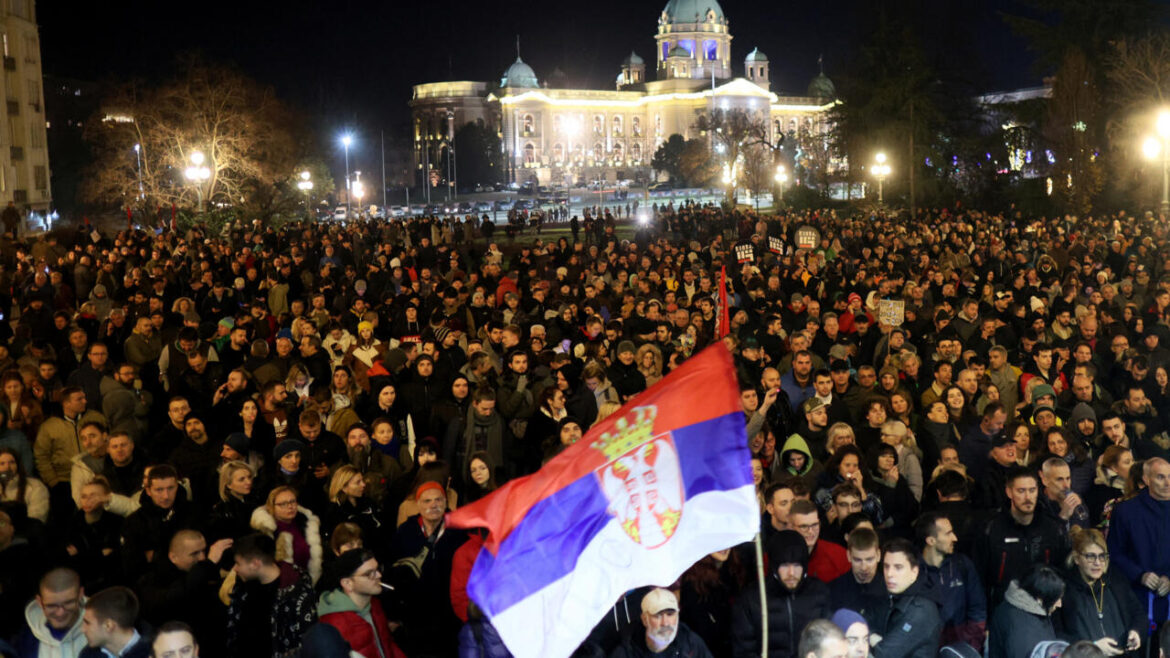Since December 19, Serbs have demonstrated every evening to demand the annulment of the results of the legislative and local elections of December 17. A vote marked by “irregularities”, according to international observers. Russia accuses the West of wanting to destabilize Serbia, an allied country.
Their mobilization does not weaken. In Serbia, thousands of demonstrators continue to gather daily in front of the electoral commission, after the Serbian Progress Party (SNS) claimed victory in the parliamentary elections on December 17, with 46.72% of the vote against 23% for the opposition coalition “Serbia against violence”.
“If nothing changes, the blockages will extend to the whole country from Wednesday,” announced the student collective of the Borba organization, “The Struggle”.
These elections were “rigged” according to the leader of the opposition, Marinika Tepic, who began a hunger strike on December 25, with six other parliamentarians, to demand their cancellation.
International observers, from the Organization for Security and Cooperation in Europe (OSCE) and the European Parliament, have denounced a series of “irregularities”, “buying votes” and “ballot stuffing”. The party of President Aleksandar Vucic would also have benefited, according to them, from preferential treatment in the media which are under the control of the power in place in Serbia.
Aleksandar Vucic rejects these accusations. But the prosecution requested an investigation on December 23.
For its part, Russia accuses the West of provoking these “unrest” and of seeking to “destabilize” Serbia, the only country in Europe which refuses to take sanctions against Russia following the war in Ukraine.
Fake addresses in Belgrade
The opposition notably believes that the victory was “stolen” from it in the Serbian capital. Because the irregularities which marred the vote particularly concern Belgrade.
“The (municipal) elections in Belgrade show, unlike the legislative elections, that the opposition party, Serbia against violence, achieved a score of around 35% of the votes against 39% for the president’s party. A small difference which could have been much more significant (in favor of the opposition) if there had not been fraud. And in particular, if Bosnian Serbs had not been brought from neighboring Bosnia to vote in Belgrade.” said Pierre Mirel, former Balkans director at the European Commission and advisor for the Grande Europe center of the Jacques Delors institute, on France Culture.
Serbs abroad have the right to vote in legislative elections, but not in municipal elections. This is also the case for Bosnian Serbs who have dual nationality.
“Identity cards and false addresses in Belgrade were given to Bosnian Serbs. There are reports of more than 20,000 people who were bussed and paid to vote for the ruling party. of President Vucic”, explains Laurent Rouy, the France 24 correspondent in Belgrade. The opposition coalition, for its part, estimates this figure at “more than 40,000 people”.
This is not the first time that the Serbian opposition has denounced electoral irregularities. “Since Aleksandar Vucic has been in power, i.e. for 11 years, in each election irregularities have been noted, specifies Laurent Rouy. What is new is that the international community has reacted. They have been, and it is a surprise, very severe in their characterization of the level of fraud.”
Germany called the alleged fraud “unacceptable” for a country hoping to join the European Union. Serbia has been an official candidate since 2014. But the country is moving further and further away from Brussels.
A Serbian Maidan “led by the American CIA and foreign services”
The Banjska affair, named after this locality in northern Kosovo, where last September a commando of several hundred heavily armed Serbs stormed the village, killing four people, has rekindled Western concerns.
Read alsoHow the attack on a village in Kosovo reignited tensions with the Serbian enemy
“Since these armed incidents, Aleksandar Vucic would no longer be seen as a solution to the Kosovar problem but as part of the problem,” analyzes Laurent Rouy. “Which could explain the evolution of the position of the international community.”
Brussels manages to maintain dialogue between Serbia and Kosovo, its former province with an Albanian majority. But Belgrade, supported by Moscow, still refuses to recognize the independence of Prishtina, which was proclaimed in 2008.
This Russian support for Serbia partly explains the double game of President Vucic who wants to both integrate the European Union and continue to maintain close ties with Russia.
Aleksandar Vucic also received Moscow’s ambassador to Belgrade, Alexander Botsan-Kharchenko, on Monday. According to the latter, he told him that “the opposition began demonstrations encouraged and supported from the outside.” “All the discontent and attempts to destabilize Vucic’s power are linked above all to his firm desire not to join the anti-Russian sanctions” decreed by the West, assured the Russian ambassador.
The president and Prime Minister Ana Brnabic see these demonstrations as a “Serbian Maidan”. They compare the protest to the pro-European revolution which resulted in 2014 in the dismissal of pro-Russian Ukrainian President Viktor Yanukovych. Ana Brnabic even thanked the Russian secret services for having communicated information on the “activities” of the opposition. Pro-government tabloids claimed in their December 25 editions that this “Serbian Maidan” was “led by the American CIA and foreign services.”
The opposition denies these accusations. “There is no evidence that Western countries are organizing protests and these claims are completely unfounded,” says Predrag Petrović, head of a Belgrade-based NGO, the Center for the Study of Security Policy, on the waves of Radio Free Europe. He believes that such statements constitute an attempt to “criminalize and delegitimize” the opposition.
With AFP



